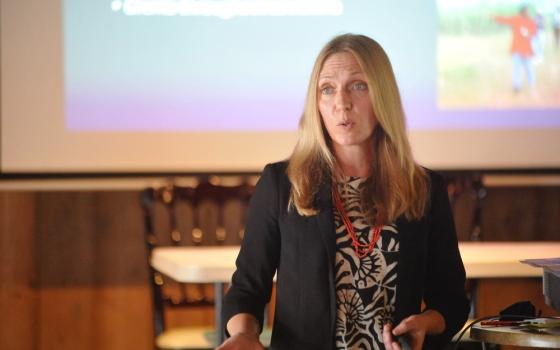Not many bishops can drag their whole diocese with them when they get indicted for failing to report information about a priest predator to the authorities. Sadly, many people are neither surprised nor saddened that Bishop Robert Finn has brought the Kansas City-St. Joseph diocese -- the institutional apparatus not the people who are really the Church -- down this rabbit hole of ignominy with him for failing to act about a priest with a computer filled with child pornography.
That is because, as the quintessential cleric, Finn has always been joined in the manner of a Siamese twin with the hierarchical apparatus, sharing the same blood type -- purple, of course -- so that they move awkwardly together, something like merged banks so tightly bound by boiled balance sheets and bad debts that examiners judge them to be one clanking entity.
Actually Finn looks more like a nervous shoplifter than a bold sinner. There is a strange fittingness to his being indicted for a misdemeanor, the equivalent of a venial sin, something out of a child’s confession, say three Hail Marys and make a good act of contrition. Finn got where he is in the organization by not growing up, by remaining a boy whose apple-cheeked ambition was to become a bishop some day, bringing the news home to mother as he once did his gold starred report card.
Ambition, attention to unimportant details, a willingness to sacrifice oneself for the system in return for a good seat in the hierarchical skybox: These are the elements that, in the wonderful Roman phrase, allow a man to “make a career in the Church.”
Finn did not drag the institution into the misdemeanor pit after him. He was permanently fixed in boyhood when, hypnotized by the gleaming crozier bobbing down the cathedral aisle, and attracted by the idea that institutional power is something to be clung to, he was carried off, like a bad luck boy in a Dickens novel, to serve an apprenticeship in the once booming mill that did the finishing work on monsignors and gave the final polish to bishops before they were deployed within the hierarchical empire.
In fact, poor Finn was destined for this fate by the hierarchical enterprise to whose allures he gave himself before he had a chance to grow up and which he has served like a good boy anxious to please his father, the pope, that is, ever since. Now the pope has let it be known that he will not have any comments to make about Bishops Finn’s indictment and the latter is left to take the fall as the organization to which he gave so much gives him so little in his desperate hour.
There is something poignant, as there always is about a boy abandoned, if not quite tragic, for a good boy is not a great man, about Finn’s present discomfort. He has learned, in a way that he earned even if he did not deserve it, what it is like to be a victim. Clericalism is, after all, an Aztec god that will tear any cleric’s heart out, whether he is guilty or innocent, as a necessary sacrifice to its own survival. Poor Finn now knows, as so many victims of clerical sexual predators do, what it is like to have the institution one loved and trusted stand massive and silent in the face of one’s suffering.
The Finn case is really part of a larger story, that of the collapse of the hierarchical system that is taking place all over the world at this time. That is what is occurring in Ireland where the aftershocks of the generations of sexual abuse scandal have sent football field-size fissures through the foundations of the hierarchy, leaving bishops scrambling to survive and wrecking the once unquestioned entente between Church and State,
The same buckling of hierarchical structures can be observed in the European countries once called Catholic; it is easy to observe in the priests who are organizing and confronting their bishops all across that continent. It is only a question of time before the earth opens in other places in the universal Church.
The Kansas City incident is only an American example of the faltering hierarchical, high clerical universe. Finn Is charged with a misdemeanor because he is, despite his blustery backwardness, a minor character in a much larger drama of the transformation of hierarchical structures that, in the Space/Information Age, can no longer control their inner lives or their outer public destinies. Finn may be least likely but he is the latest victim of the clericalism that made the sex abuse scandal possible and whose presumptions to preferment and diplomatic immunity generated the pain it has visited on others and is accelerating its collapse.
[Eugene Cullen Kennedy is emeritus professor of psychology at Loyola University, Chicago.]
Editor's Note: We can send you an e-mail alert every time Kennedy's column, Bulletins from the Human Side," is posted to NCRonline.org. Go to this page and follow directions: E-mail alert sign-up. If you already receive e-mail alerts from us, click on the "update my profile" button to add Kennedy to your list.



